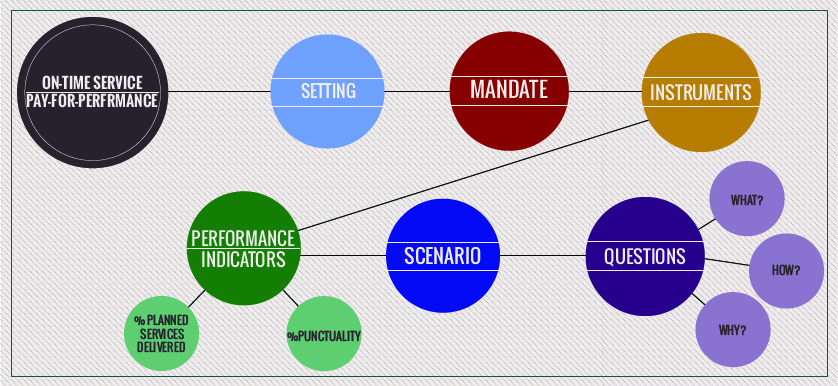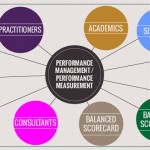Performance Management case study: Balancing on-time service and pay-for-performance in urban public transport
smartKPIs.com Performance Architect update 18/2010
Delivering urban public transportation services today is a challenge due to the slow process of upgrading infrastructure and the general trend of population increase in large cities. Finding a balance between service delivery and punctuality requires careful planning and active monitoring of results. The case study illustrated below highlights some of the challenges and trade-offs that have to be explored by each operator.
CompanyUrban public transportation operator.
SettingWhile in many cities the local public transport is operated by the government, a trend that gained momentum over the last 15 years is the outsourcing of the operations of the infrastructure. This way the government becomes a customer of a separate entity responsible for the service delivery to the wider public. The arrangement as benefits for both sides. The government shifts some of the pressure from citizens regarding the quality of the public transport services towards the operator, limiting a sensitive issue at election time. The operator manages a monopoly or in some instances is part of an oligopoly of service providers.
MandateOperate a safe and reliable public transportation system, delivering quality services for the public.
InstrumentsTo stimulate the improvement of services, Service Level Agreements clarify responsibilities of both parties and outline performance standards that the service operator needs to meet. A common element in such agreements is a pay-for-performance arrangement that rewards or penalizes the operator based on the achievement of set targets.
Performance indicatorsSome of the commonly used KPIs in such agreements are:
% Planned services delivered (monitoring if services are operated)
% Punctuality (monitoring if the set schedule for each stop is followed)
These two KPIs are key to evaluating the customer experience. The first outlines if the routes planned to be serviced each day were delivered at all, while the second monitors how well were these routes serviced in terms of punctuality.
ScenarioOne afternoon, a passenger on the way home from work gets on a bus, validates the ticket and takes a seat, waiting for the bus to arrive at the desired stop, the second last of the line.
At the fourth stop before the end of the line, the bus driver announces all passengers that he has been requested to finish the route early at that stop. Everyone is invited to get off the bus and once the bus is empty, it skips the last three stops of the route, continuing with the return service.
Our passenger has paid the travel fare, expecting in return the arrival to destination, as planned. The early termination of the route by the public transport operator resulted in diminished utility of the amount spent and in an incomplete journey.
Questions- What is the relationship between the KPIs used to track service performance and the decision to change the route of the bus?
- How is the estimated impact on customer satisfaction of such actions?
- Why aren’t customer satisfaction KPIs used as widely as service delivery KPIs in transport operator SLAs?
Stay smart! Enjoy smartKPIs.com!
Aurel Brudan
Performance Architect, www.smartKPIs.com
Discuss the case in the smartKPIs.com Forum
This Performance Management Case Study is now available in the smartKPIs.com Forum, where members of the smartKPIs.com community are invited to contribute to the discussion (after logging in by using their registration details). New members are invited to join (for free) the smartKPIs.com community.

Tags: Aurel Brudan, Case Study, Performance Architect Update, Transportation performance






